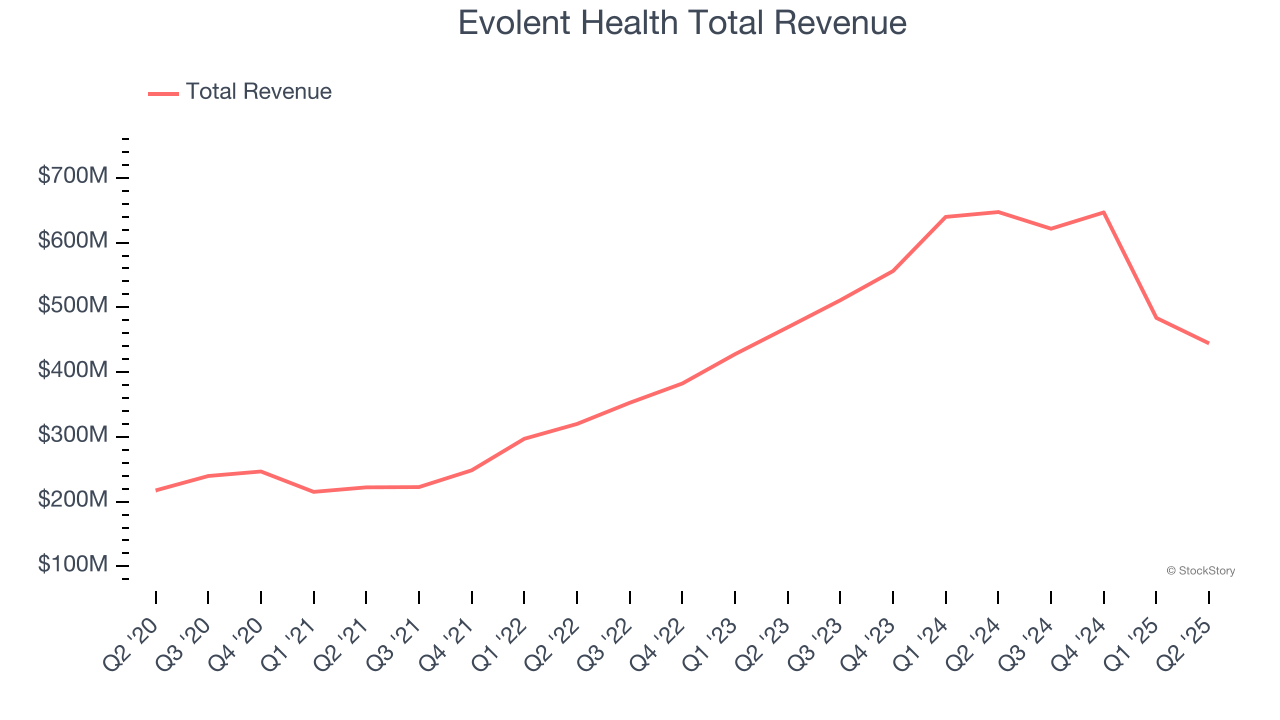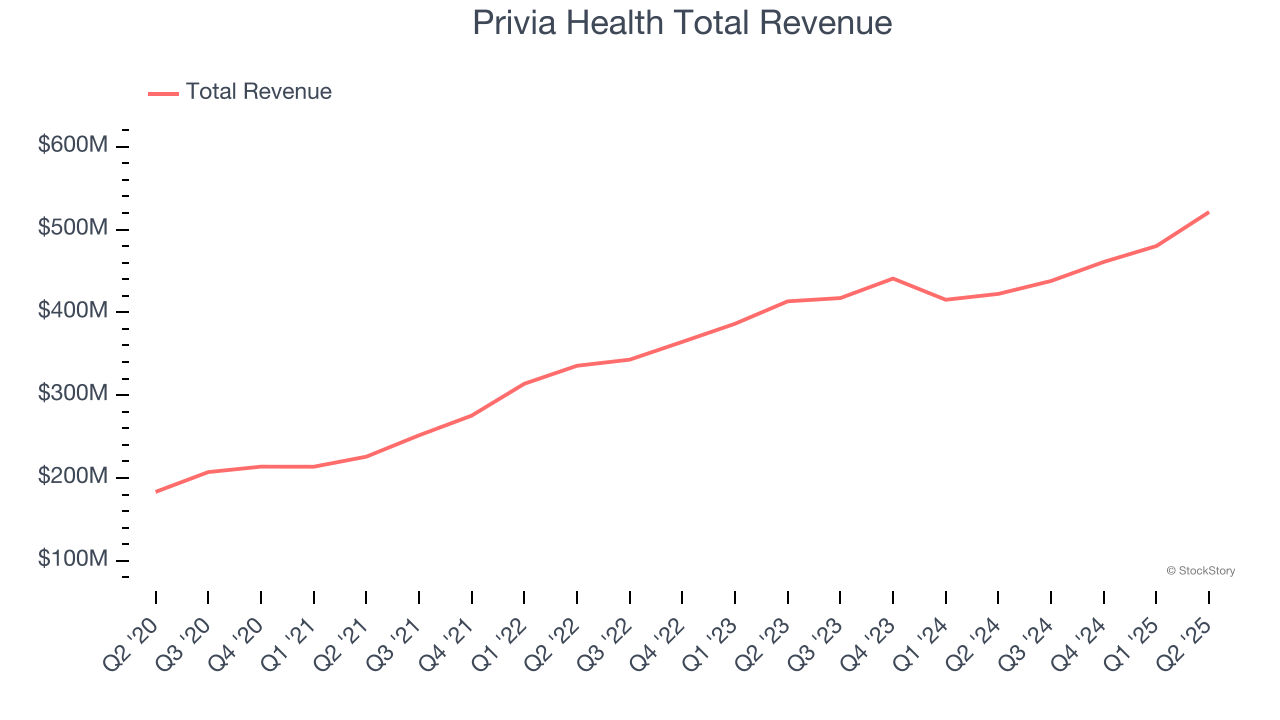
Let’s dig into the relative performance of Evolent Health (NYSE: EVH) and its peers as we unravel the now-completed Q2 healthcare technology for providers earnings season.
The healthcare technology sector provides software and data analytics to help hospitals and clinics streamline operations and improve patient outcomes, often through value-based care models. Future growth is expected as providers prioritize digital transformation to manage rising costs and patient demands. Tailwinds include the adoption of AI-driven tools and government incentives for digitization. There challenges as well, including long sales cycles and slow adoption by providers, who may be resistance to change. Tightening hospital budgets and cybersecurity threats are additional risks that could slow adoption.
The 5 healthcare technology for providers stocks we track reported a satisfactory Q2. As a group, revenues beat analysts’ consensus estimates by 4% while next quarter’s revenue guidance was in line.
Luckily, healthcare technology for providers stocks have performed well with share prices up 12.1% on average since the latest earnings results.
Weakest Q2: Evolent Health (NYSE: EVH)
Founded in 2011 to transform how healthcare is delivered to patients with complex needs, Evolent Health (NYSE: EVH) provides specialty care management services and technology solutions that help health plans and providers deliver better care for patients with complex conditions.
Evolent Health reported revenues of $444.3 million, down 31.3% year on year. This print fell short of analysts’ expectations by 3.3%. Overall, it was a softer quarter for the company with a significant miss of analysts’ EPS estimates and a slight miss of analysts’ sales volume estimates.
Seth Blackley, Co-Founder and Chief Executive Officer of Evolent stated, "Evolent exceeded our EBITDA targets for the second quarter and raised our profitability outlook for the full year. In addition, we continue to see a rapidly accelerating pipeline for new business and based on this acceleration we would expect to exceed our historical growth rates for 2026. The combination of these factors we believe demonstrates Evolent's critical role in the system where our solutions seek to simultaneously improve quality for members, reduce administrative burden for providers and manage affordability for the system. Finally, as we mark the one-year anniversary of launching of Auth Intelligence, we remain confident in achieving the near-term AI and automation targets exiting 2025 while also seeing a path to become a leader in the market on the use of clinical data exchange and AI allowing us to continue to innovate on how specialty care is managed."

Evolent Health delivered the weakest performance against analyst estimates, slowest revenue growth, and weakest full-year guidance update of the whole group. Unsurprisingly, the stock is down 5.3% since reporting and currently trades at $9.18.
Read our full report on Evolent Health here, it’s free.
Best Q2: Privia Health (NASDAQ: PRVA)
Operating in 13 states and the District of Columbia with over 4,300 providers serving more than 4.8 million patients, Privia Health (NASDAQ: PRVA) is a technology-driven company that helps physicians optimize their practices, improve patient experiences, and transition to value-based care models.
Privia Health reported revenues of $521.2 million, up 23.4% year on year, outperforming analysts’ expectations by 10.9%. The business had a very strong quarter with an impressive beat of analysts’ sales volume estimates and a beat of analysts’ EPS estimates.

Privia Health pulled off the biggest analyst estimates beat among its peers. The market seems happy with the results as the stock is up 14.5% since reporting. It currently trades at $22.68.
Is now the time to buy Privia Health? Access our full analysis of the earnings results here, it’s free.
Premier (NASDAQ: PINC)
Operating one of the largest healthcare group purchasing organizations in the United States with over 4,350 hospital members, Premier (NASDAQ: PINC) is a technology-driven healthcare improvement company that helps hospitals, health systems, and other providers reduce costs and improve clinical outcomes.
Premier reported revenues of $262.9 million, down 12.5% year on year, exceeding analysts’ expectations by 5%. It may have had the worst quarter among its peers, but its results were still good as it also locked in a beat of analysts’ EPS estimates.
Interestingly, the stock is up 7.3% since the results and currently trades at $26.25.
Read our full analysis of Premier’s results here.
Astrana Health (NASDAQ: ASTH)
Formerly known as Apollo Medical Holdings until early 2024, Astrana Health (NASDAQ: ASTH) operates a technology-powered healthcare platform that enables physicians to deliver coordinated care while successfully participating in value-based payment models.
Astrana Health reported revenues of $654.8 million, up 34.7% year on year. This print beat analysts’ expectations by 2.7%. It was a strong quarter as it also logged a beat of analysts’ EPS estimates and full-year revenue guidance slightly topping analysts’ expectations.
Astrana Health pulled off the fastest revenue growth among its peers. The stock is up 36.9% since reporting and currently trades at $29.37.
Read our full, actionable report on Astrana Health here, it’s free.
Omnicell (NASDAQ: OMCL)
Driven by the vision of an "Autonomous Pharmacy" with zero medication errors, Omnicell (NASDAQ: OMCL) provides medication management automation and adherence tools that help healthcare systems and pharmacies reduce errors and improve efficiency.
Omnicell reported revenues of $290.6 million, up 5% year on year. This number surpassed analysts’ expectations by 4.9%. Overall, it was a strong quarter as it also put up a beat of analysts’ EPS estimates and a solid beat of analysts’ full-year EPS guidance estimates.
Omnicell achieved the highest full-year guidance raise among its peers. The stock is up 7.1% since reporting and currently trades at $31.86.
Read our full, actionable report on Omnicell here, it’s free.
Market Update
Thanks to the Fed’s rate hikes in 2022 and 2023, inflation has been on a steady path downward, easing back toward that 2% sweet spot. Fortunately (miraculously to some), all this tightening didn’t send the economy tumbling into a recession, so here we are, cautiously celebrating a soft landing. The cherry on top? Recent rate cuts (half a point in September 2024, a quarter in November) have propped up markets, especially after Trump’s November win lit a fire under major indices and sent them to all-time highs. However, there’s still plenty to ponder — tariffs, corporate tax cuts, and what 2025 might hold for the economy.
Want to invest in winners with rock-solid fundamentals? Check out our Strong Momentum Stocks and add them to your watchlist. These companies are poised for growth regardless of the political or macroeconomic climate.
StockStory is growing and hiring equity analyst and marketing roles. Are you a 0 to 1 builder passionate about the markets and AI? See the open roles here.





